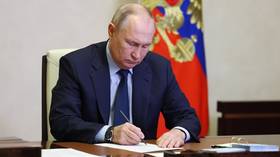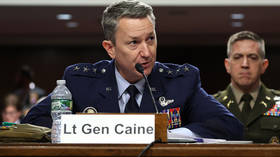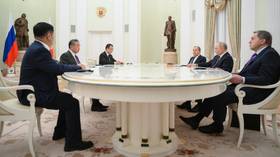Germany sets deadline for dropping Russian oil – Bloomberg

Germany plans to ditch Russian oil imports by the end of the year, Bloomberg News reported on Sunday, citing anonymous sources familiar with the issue. The measure will apparently be adopted whether or not the EU reaches a consensus on a Russian oil embargo.
The German Chancellor’s Office is now in talks with alternative suppliers and Berlin is confident it will be able to resolve all remaining issues within six to seven months, according to Bloomberg. The sources did not reveal which nations could replace Russian oil supplies to Germany.
Before the start of Moscow’s military operation in Ukraine, 35% of Germany’s oil imports came from Russia. Since the conflict broke out, Berlin has cut that figure down to 12%.
The news agency said Germany’s biggest challenge will be supplying a key refinery, currently relying solely on Russian imports. The Schwedt facility provides fuel to most filling stations in the capital, as well as the surrounding state of Brandenburg and the city’s international airport.
German authorities reportedly plan to use an old pipeline linking the Schwedt refinery to the northern port city of Rostock, but that would require an upgrade for the infrastucture, which currently only has the capacity to meet 60% of the facility’s needs. Oil can be delivered to Rostock from a national reserve, located near another port, Wilhelmshaven.
An alternative route being considered by the government would see a Bavarian refinery covering Berlin airport’s fuel demand.
Earlier, German Economics Minister Robert Habeck warned that the eastern part of Germany might face petrol shortages if oil supplies from Russia are cut off as part of an EU-wide embargo.
On Sunday, regional environment ministers suggested introducing a motorway speed limit for a “limited period” as a way to reduce fuel consumption and dependency on Russian imports. Germany is one of the few nations that does not have such a limit.
The EU is, meanwhile, still debating the next round of anti-Russia sanctions. On Friday, several media outlets reported that the restrictions are unlikely to include an oil embargo because of Hungary’s resistance.
On Saturday, the European Commission reportedly agreed on a plan that would allow companies to keep buying Russian natural gas without violating sanctions. According to Bloomberg, the European companies would be technically able to open euro or dollar accounts in Russia’s Gazprombank and make payments in euros or dollars that would be then converted into rubles, as Moscow has requested.
Russia attacked Ukraine in late February, following Kiev’s failure to implement the terms of the Minsk agreements, first signed in 2014, and Moscow’s eventual recognition of the Donbass republics of Donetsk and Lugansk. The German- and French-brokered protocols were designed to give the breakaway regions special status within the Ukrainian state.
The Kremlin has since demanded that Ukraine officially declare itself a neutral country that will never join the US-led NATO military bloc. Kiev insists the Russian offensive was completely unprovoked and has denied claims it was planning to retake the two republics by force.















